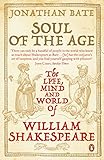This is my review of Soul of the Age: The Life, Mind and World of William Shakespeare by Jonathan Bate.
Sequenced to follow the seven phases of a man’s life in the famous “All the world’s a stage” soliliquy, chapters takes the form of themed essays.
Readers will be struck by different revelations and insights in the spate of ideas. I realised for the first time that it was the banning of the cycles of medieval mystery plays by the Protestant Reformation which created a vacuum into which Shakespeare could present his new plays, untrammelled by dogma, relatively free to range over a wide range of topics and ideas.
I liked the idea of Shakespeare continually drawing on his Warwickshire roots. So, when culling ideas for “As You Like It” from a prose romance called “Rosalynd”, he turned the forests of the Ardennes into Arden. When insulted for his lowly origins by an educated, now forgotten rival playwright, who called him “an upstart crow beautified with our feathers”, Shakespeare took humorous revenge in “The Comedy of Errors” with a punning dialogue on “breaking in with a crow without feather” that is to say, a crowbar. The exchange is much more entertaining when you know the context.
It was the father of a friend of Shakespeare’s who translated into English details of the universe according to Copernicus, with the sun at the centre. When the accepted belief was in the “necessary correspondence between the order of the cosmos and that of the state”, Shakespeare showed his independence of mind and flexibility of thought in giving humorous irony to to Edmund in “King Lear”:
“when we are sick in fortune – often the surfeits of our own behaviour – we make guilty of our disaster the sun, the moon and stars, as if we were villains of necessity…..My father compounded with my mother under the dragon’s tail and my nativity was under Ursa Major, so that it follows I am rough and lecherous”.
Just before the abortive coup which ended in his execution, the Earl of Essex may have been inspired to sedition by Shakespeare’s Richard II: if Shakespeare had been sent to the Tower for this, great works such as Othello, Lear, Macbeth and the Tempest might never have been written. As it was, eighteen of his major plays which did not appear in print in his lifetime would probably have been lost if two colleagues from the Company of King’s Men to which he belonged had not ensured their publication after his death.
We see Shakespeare daring to experiment with the ideas of Montaigne, exploring a range of philosophies including the Epicurean view, suspected because of its association with atheism: the need to give vent to one’s feelings rather than maintain Stoical patience, for “Sorrow concealed, like an oven stopped, Doth burn the heart to cinders where it is.”
There are gaps in our knowledge of Shakespeare. Was he obliged to steer clear of King James’s court for a while since he had syphilis? Yet we have many remarkable details, such as the amount a colleague left him in his will, the fact that his energy was exhausting, but there was widespread admiration for his “wit” in the widest sense of linguistic talent, humour, imagination and judgement. So, the author’s occasional attempts at surmise seem like unnecessary contrivance.
With his astonishing knowledge of Shakespeare’s life and works, perhaps Jonathan Bate may be forgiven a convoluted style and a weight of detail which is sometimes too much to absorb. This book has helped me to appreciate Shakespeare’s wit and insight, filling me with good intentions to revisit his sonnets, even study some of his plays again.
4 Stars
